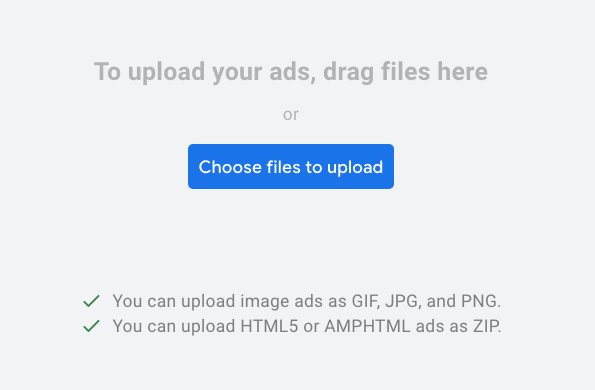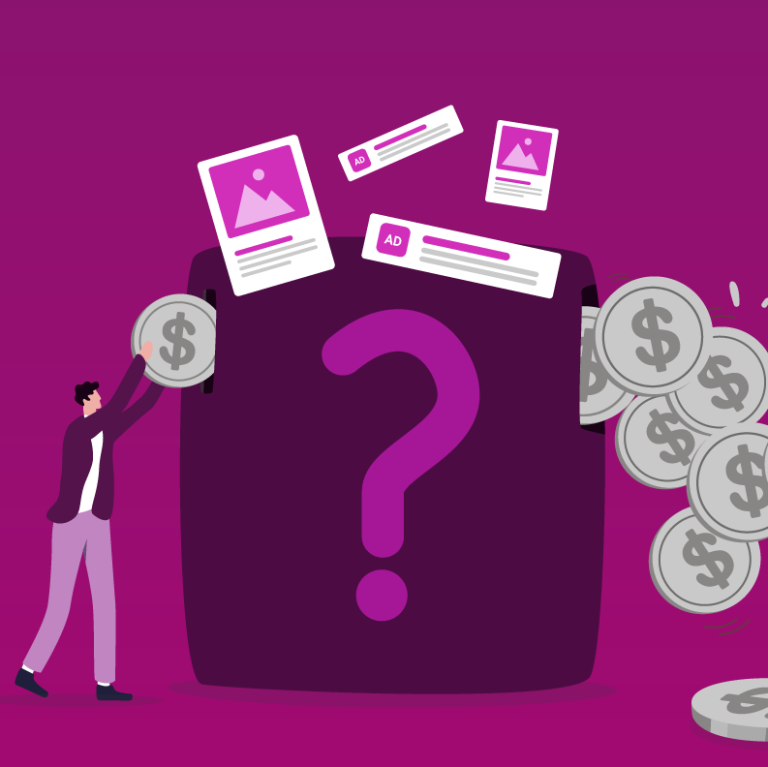Last Updated on February 26, 2021
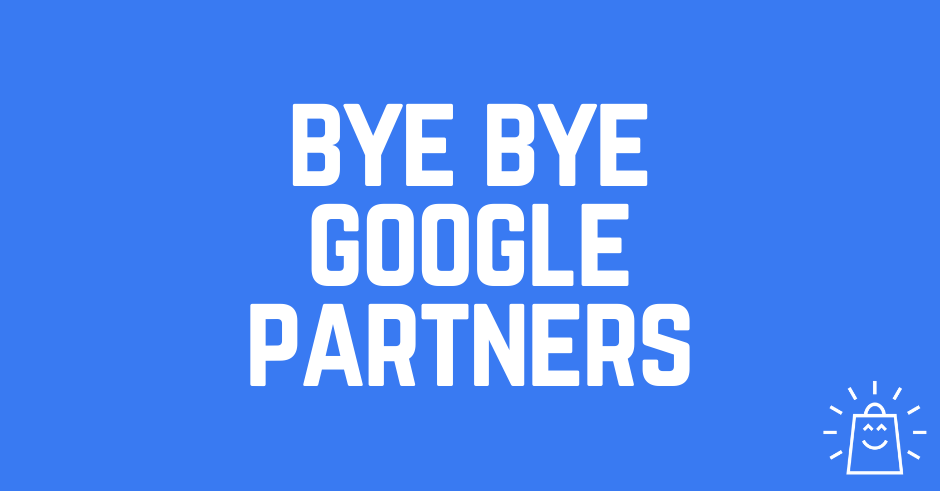

Back in 2013, I was really proud to become one of the first Google Partners in Belgium.
When I got that badge, I plastered it everywhere I could: on my site, in presentations, bios and even in client proposals.


Not that potential clients ever bothered to ask about it.
But I told them anyway: what the Google Partner program entailed, what requirements you had to meet, and how not everyone could qualify for it.
Besides these imaginary benefits, being part of the program was pretty useful at first.
I had an account rep at Google that was really helpful and got a lot of training and support that helped me to grow my business.
But over time, the program has gotten a lot less useful.
And today, I feel that being a Google Partner actually hurts the work you do for clients.
So whether you’re considering to become a Google Partner, or you’re a company looking to hire a new agency to run your Google Ads campaigns, there are some important details to know!
Let me tell you all about them!
Table of Contents
What is the Google Partner program?
There are millions of businesses using Google Ads, which makes it hard for Google to manage them individually.
Enter Google Partners.
These are agencies, consultants or freelancers that do the following for Google:
- Client acquisition: a web design agency might convince a client to also start running Google Ads to their brand new website
- Support: Partners take care of first-line support, they answer client questions and figure out how to fix operational or technical problems
- Account management: keep the client and expand the revenue through upsells (increase ad spend) or cross-sells (run other types of campaigns)
Google Partners don’t this for charity, most of the things that are interesting to Google, also make the Partner more money.
But there are a couple of extras advantages they get thanks to the Google Partner Program:
- A framework to prove their skillset: certifications
- Support in improving up their skillset: understanding new ad formats, better account optimization, etc.
- Business support: training and coaching on pricing, effective consulting, etc.
- Football tables, mini-fridges, and tablets (these are the prizes as part of the competitions)
Starting out, Google invested heavily in the program. I remember an amazing coaching session with Alex Langshur from Cardinal Path, which had a huge impact on my consulting work.
But for some reasons (organizational restructure, budget cuts, targets not met?), the Google Partner Program got less love internally.
Support was moved to an outside partner, then brought back in-house, then outsourced completely.
This really removed the feeling of being an actual partner, to being used as a resource to meet a target.
Shifting Requirements
The changes outlined above had left me with a “meh” feeling about the Google Partners program these last couple of years.
But a revision of the program’s requirements early 2020 put the final nail in the coffin for me.
Th impact of COVID-19 on small businesses and negative feedback from the community caused Google to loosen it’s requirements.
Let’s take a look at the requirements:
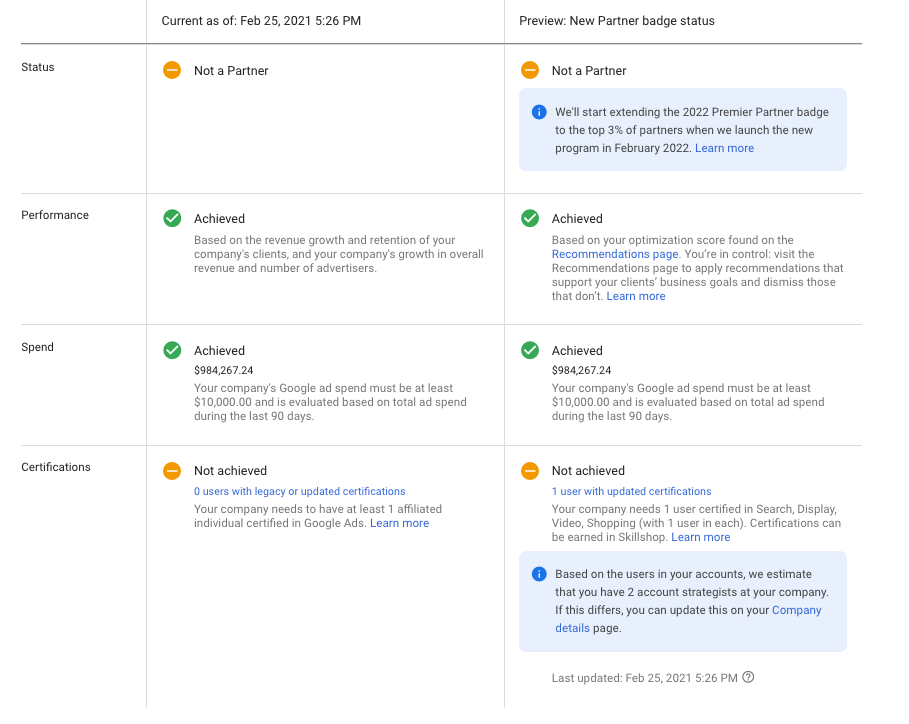

On the left-hand side you can see the current Partner status and requirements, on the right-hand side you can see what’s changed.
Let’s run through the biggest changes.
1- More Skillshop Certifications
Before you needed at least 1 person to get a Google Ads certification, now you need to have 50% of your Company Account Strategists.
The initial overhaul of the Partner program had as a requirement that 50% of users linked to the MCC needed to be certified.
That raised a lot of concerns.
Like this one:
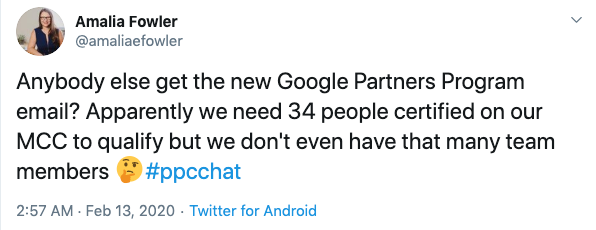

An update is now that you can indicate how many Company Account Strategists you have:
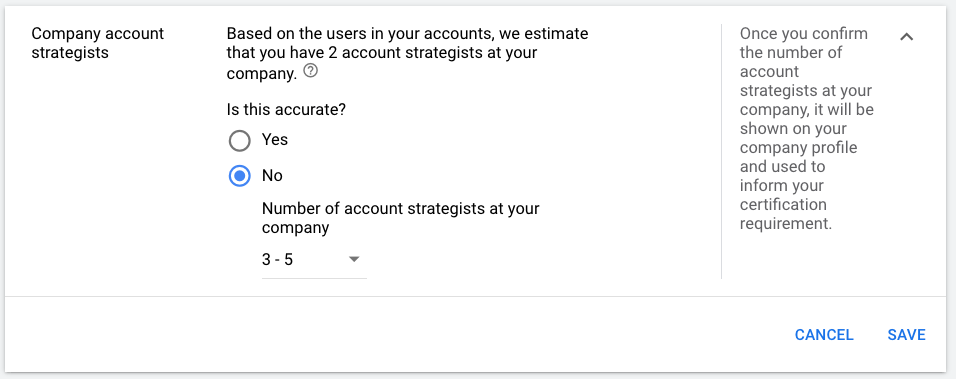

This is a good update, because you can indicate how many people actually work on the account, as opposed to a manager or boss that has view access.
Then only 50% of the people that work on the account will need to be certified.
The old certifications obtained from the “Academy For Ads” won’t be valid anymore (this is what google now calls “legacy” certifications). So everyone will be required to take the new Skillshop exams.
There you take an exam for the specialization you want to be certified in: Google Ads Search, Google Ads Display, Google Ads Video, and Shopping ads.
I would say that Google fixed this part with its new update. But the next part is what’s still irking me.
2 – Google Partners Performance Requirement 🤬
Google has always had a “Performance” component as part of the Google Partner badge.
It used to include a bunch of best practices like adding negative keywords, sitelinks, different keyword match types, bid adjustments, to the accounts you manage.
Here is how Google still defines “good performance”:
Delivering solid overall ad revenue and growth, and maintaining and growing your customer base.
But with this new update, “Performance” will now center around “Recommendations”. This is the thing that’s caused me to write this post and actively come out against the Google Partner program.
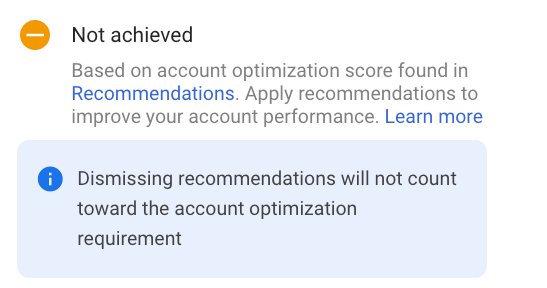

This literally means: if you don’t implement our recommendations, you can’t be part of this program.
Not all recommendations are bad, but many of them aren’t exactly tailored to a specific campaign. The common theme behind a lot of them is about increasing ad spend and the adoption of new features. Both which are great for Google, but necessary for the advertiser.
Take a look at these 3 recommendations I just pulled from a client’s account:
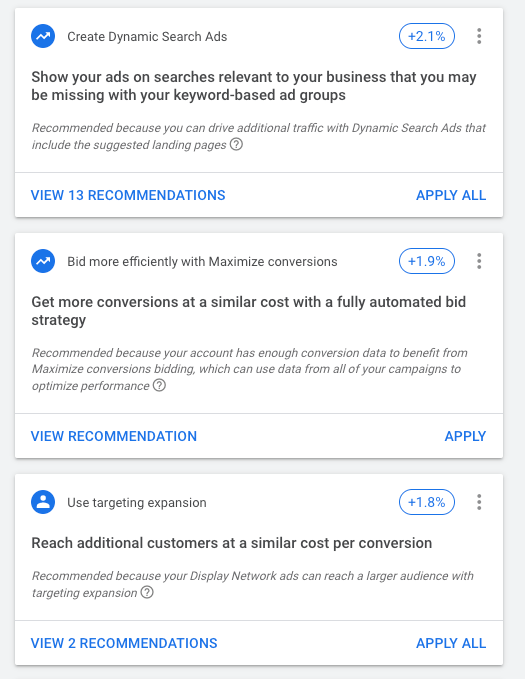

- Create Dynamic Ads
- Use Maximize conversions as a bidding strategy
- Use targeting Expansion in my remarketing campaign
While these could be good suggestions, they are not relevant in these campaigns because I know they won’t achieve my client’s goals.
Sometimes I might use a recommendation, but as someone that gets paid to manage campaigns for a client, your obligation is to the client, not to Google.
This is all reflected in the Optimization Score:


The first thing to mention about the Optimization Score is: this score doesn’t have anything to do with the actual performance of the account.
I have a campaign that’s delivering amazing results and it has a score of 13.8%.
So using the “OptiScore” as the main metric to optimize your account is clearly the wrong move
So imagine my surprise when I found out that Google Belgium organized a competition to find the Google Premier Partner with the best OptiScore across their MCC account.
Here is an actual quote from Google about that “OptiScore Race” competition:
The average OptiScore increased from 80.5 to 85.5 📈- a big uplift for more customer success!
Please join us to celebrate all the Racing teams and the Winners on October 9th at 4PM – the Google OptiScore Lead is flying over to celebrate with us and we’ll have drinks 🍾to announce the winners and thank you for your participation.
So in exchange for a few drinks, big agencies are willing to tank their client’s performance.
To get back to the issue at hand, if you want to qualify as a Google Partner, the average Optimization Score of accounts linked to your MCC needs to be above 70%.
This leaves some room for dismissing recommendations, but not a whole lot.
If you have campaigns with a score of 13.8%, those really drags down the account average.
So while from a ROAS/profit perspective things might be great, you might be incentivised to make changes to improve that score.
That’s a dynamic I’m uncomfortable with, and I’m sure a lot of clients would also be if they knew what was going on behind the scenes.
Does the “updated new” Partner Program Change anything?
Here is what Google changed after the initial backlash:
- Keep minimum ad spend at $10,000 in the last 90 days
- Change 50% certification requirement for all users to Company Account Strategists
As I said, #2 is a pretty good move. #1 doesn’t really change a thing in my opinion.
The main problem is still the Optimization Score requirement.
Why Google F**ked Up Its Partner Program
So why is Google actively sabotaging its own partner program?
It’s all about the money. Google’s revenue is under pressure. The growth in clicks and CPCs are stalling.
So to combat this, Google has followed its trusty playbook:
- Put more ads in the search results
- Make them harder to see
- Educate the Google Partners about new ad formats or platforms they could use, and give them the tools to sell it to their clients.
Sometimes these suggestions made sense for clients, other times not. In the end, it’s your client so you decide whether or not to pursue it.
But now things have become less voluntary.
With the Recommendations and OptiScore becoming part of your performance review, interests get very misaligned.
Now being a Google Partner actually has the opposite effect as it once had.
Rather than being someone that can deliver results, you’ve become someone that “Blindly Follows Google’s Advice”.
If I was an advertiser, I wouldn’t feel comfortable trusting my ad budget with them.
Google Premier Partners
These kinds of shenanigans also erode the value of a special kind of Google Partner, the Google Premier Partners.


This was a higher tier Partner that was vetted more thoroughly, needed multiple people to be certified, managed more ad spend and was required to attend the Premier Partner conference at Google HQ.
Unlike the normal Partner badge, these weren’t trivial to get.
But the changes to the program also reset this type of Partner.
The New Premier partners will be selected from the top 3% of all agencies “based on a number of factors, including but not limited to: annual Ads spend across managed accounts, client growth, client retention, and other information. Evaluation is done on an annual basis and status may not be available in all markets.”
Google Partner Alternatives
Ok, Dennis, with all this hate of the Google Partners program, what’s your alternative?
If you get paid to manage Google Ads, there is only one thing important:
PUT YOUR CLIENT FIRST
No matter how many free tablets, air hockey tables or drinks Google sponsors, you are responsible for doing the things that achieve for your clients first.
Update December 2020: After a suggestion from one of our readers, we’ve launched The Clients First Club. There is also a badge, but the requirements make a lot more sense. Join us!
Google Ads Support For Outsiders
For those claiming to have special support because they are a Google Partner, this overview from Google’s website seems to contradict that:
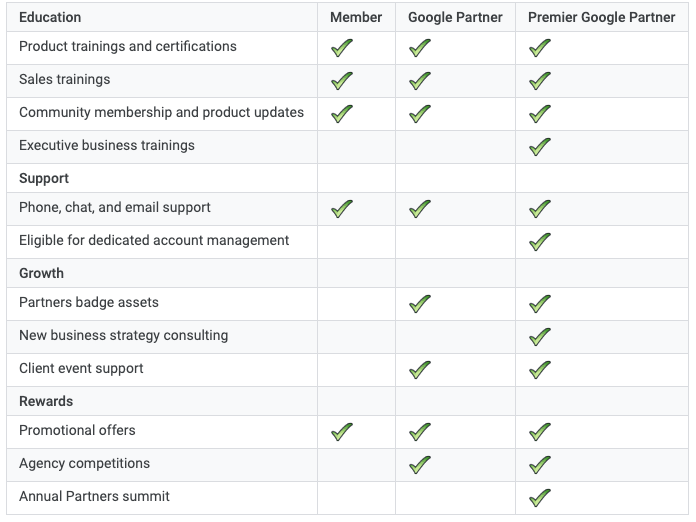

I haven’t been an official Google Partner for a while, and I’ve found them to be just as helpful as before.
Beta invites
As a Google Partner, you hear more often about what Google is up to a little earlier than others.
Sometimes this allows you to opt your clients into new beta programs that have the potential to be very lucrative because you’re the first advertiser using these features.
But when those features are rolled out globally, that advantage goes away pretty quickly.
I also want to say that I’ve been added to a couple of beta programs via regular support.
The problem is that these beta features often have an NDA associated with them. So if no-one is talking about it, it’s hard to know they exist in the first place 🙂
Getting certified and finding new clients
To distinguish yourself from others, you’ll need to do a lot better than slapping the Google Partner badge on your website.
If that was your strategy for finding new clients, the business probably isn’t booming.
Most clients don’t care either:
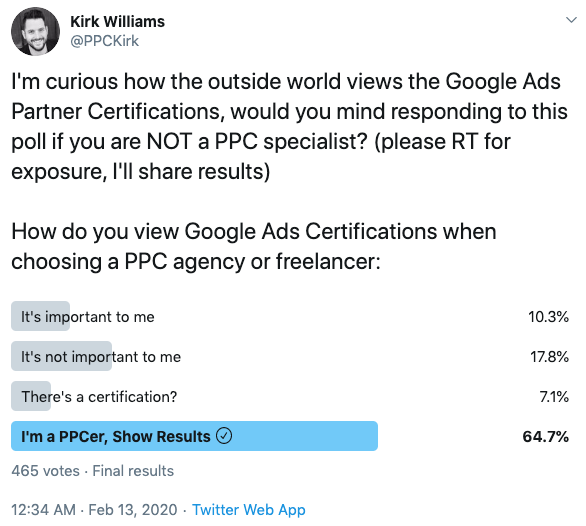

The certifications part of the Partner program requires an absolute basic level of Google Ads knowledge. You can get certified without ever having managed a single campaign in your life.
So instead of focusing on the theory, start doing the actual work. Leverage that works into real case studies you can share in an article or as a speaker at a local event.
If you don’t feel ready yet to handle clients, consider a course that will teach you how to get results, not just make Google more money!
Few! It feels good to get this off my chest 🙂
What do you think about the Google Partner Program? What benefits is it giving you?

